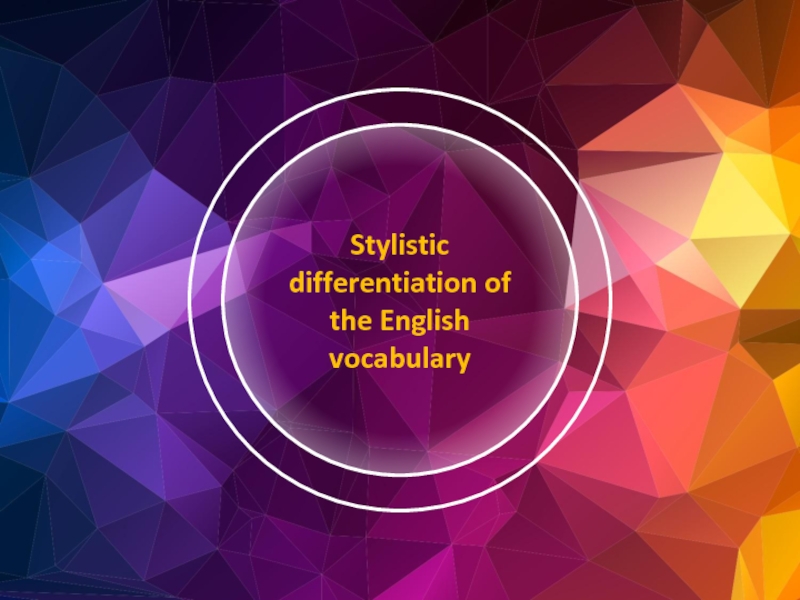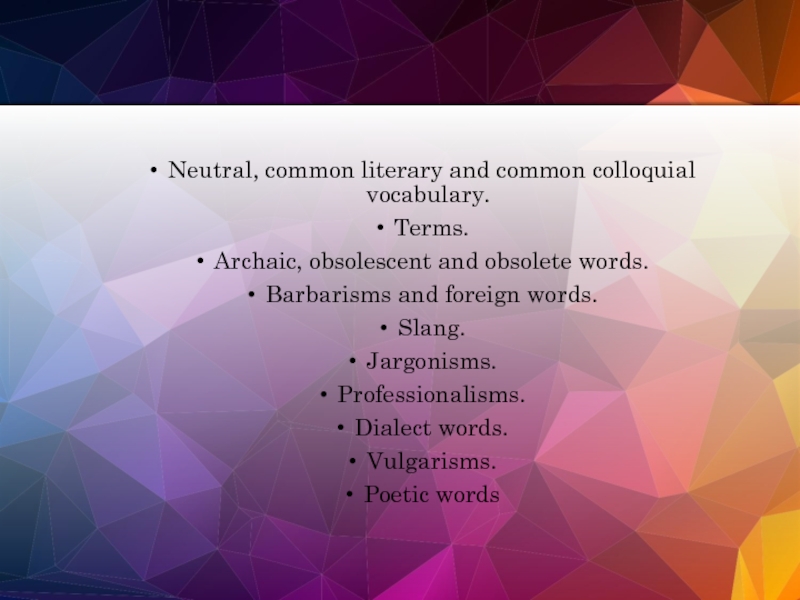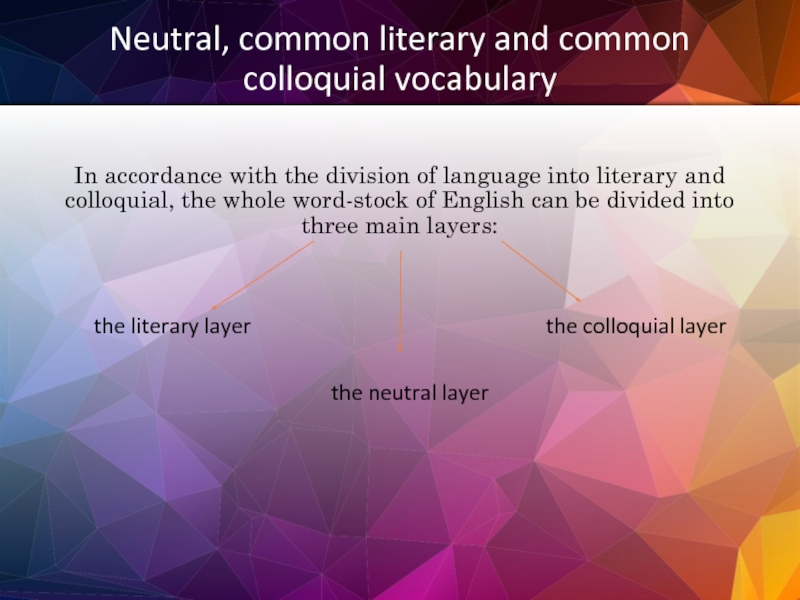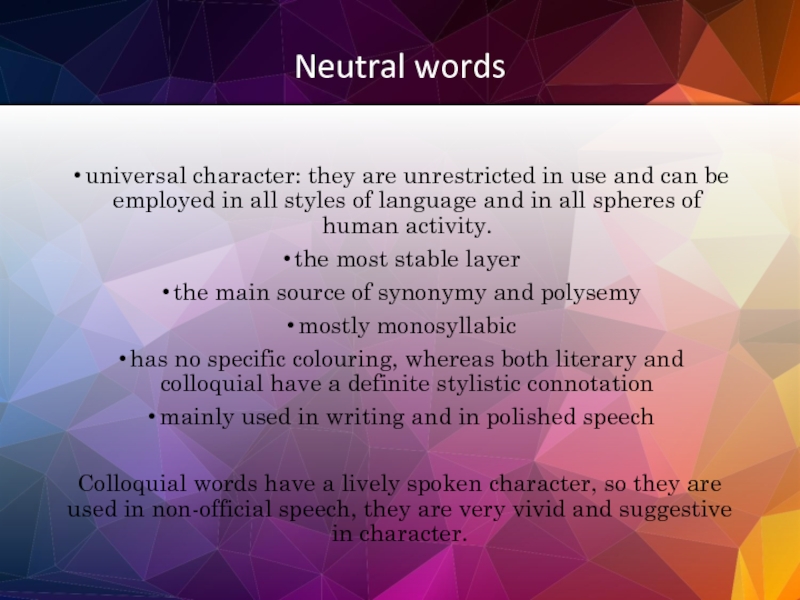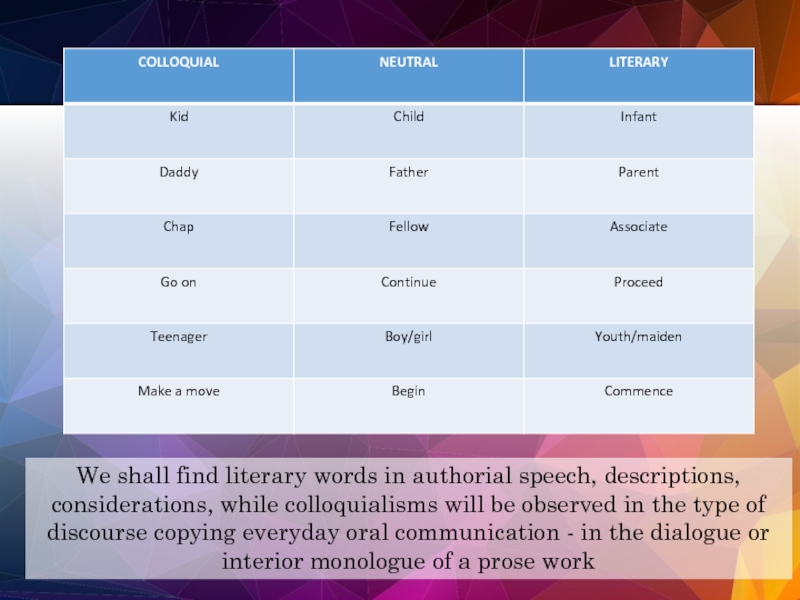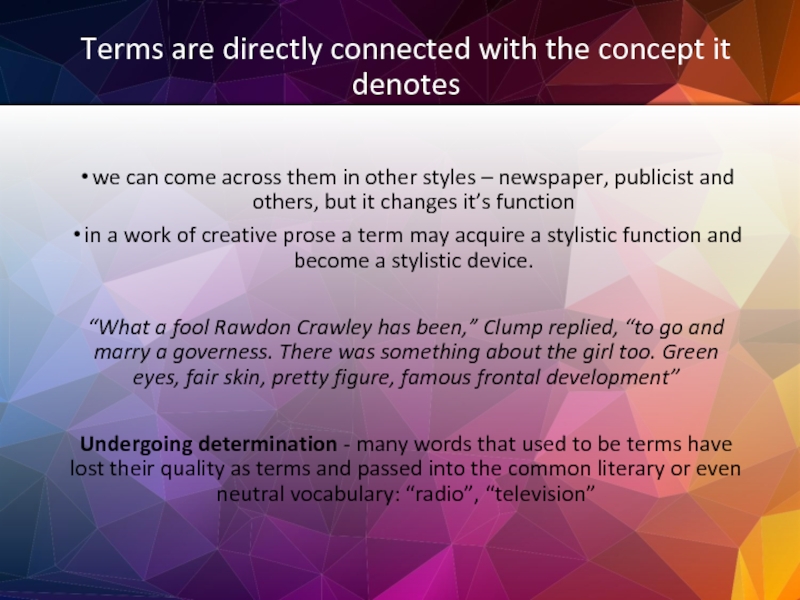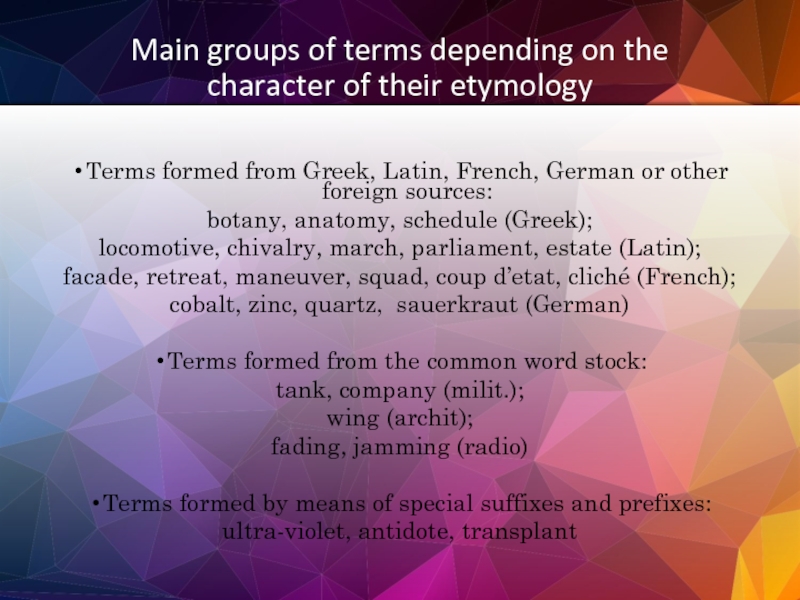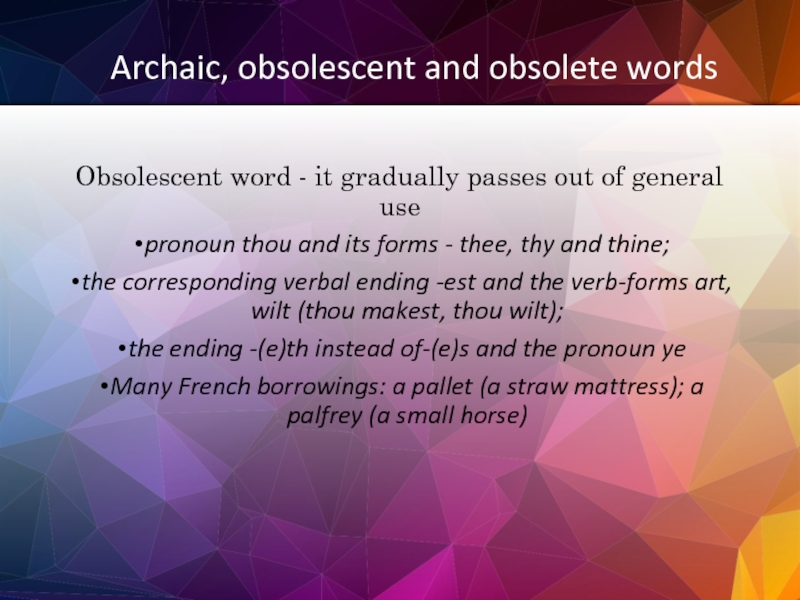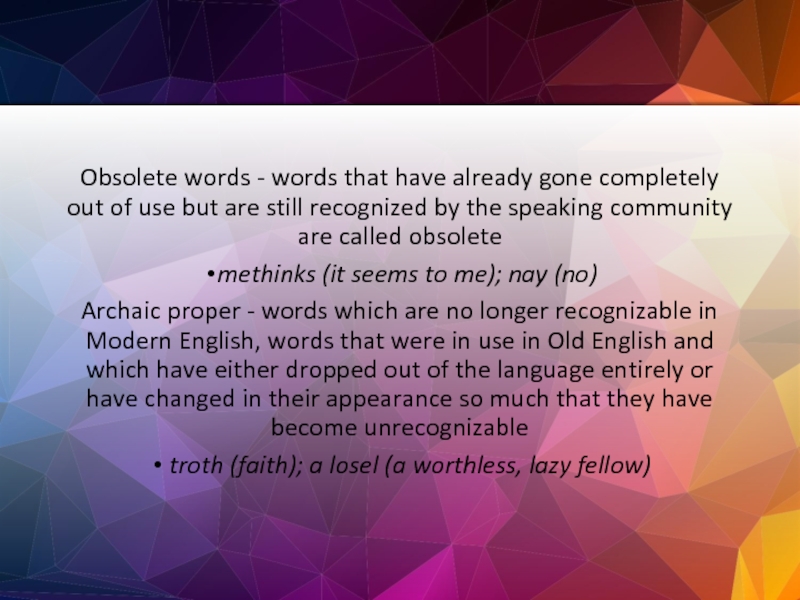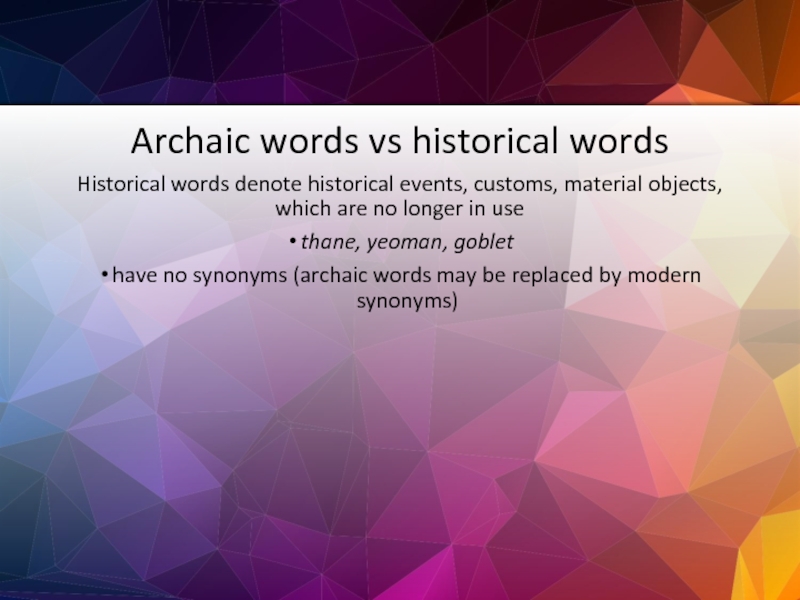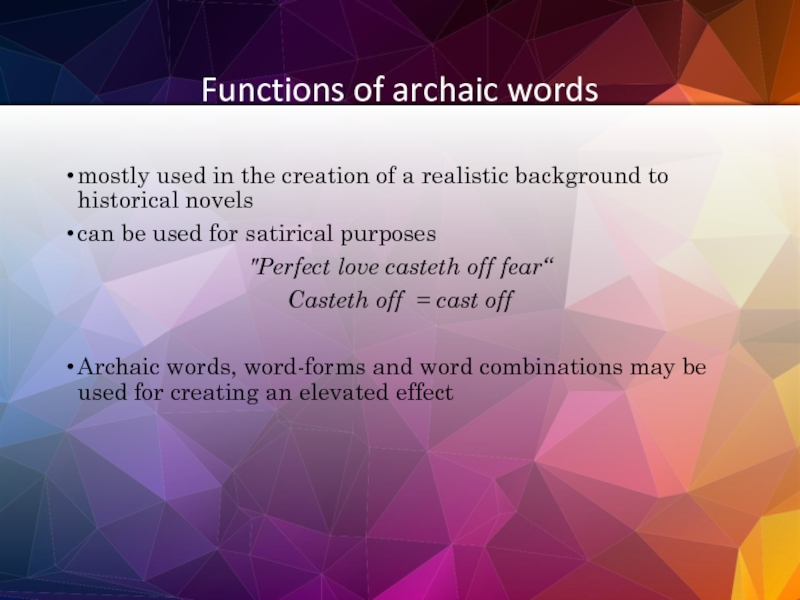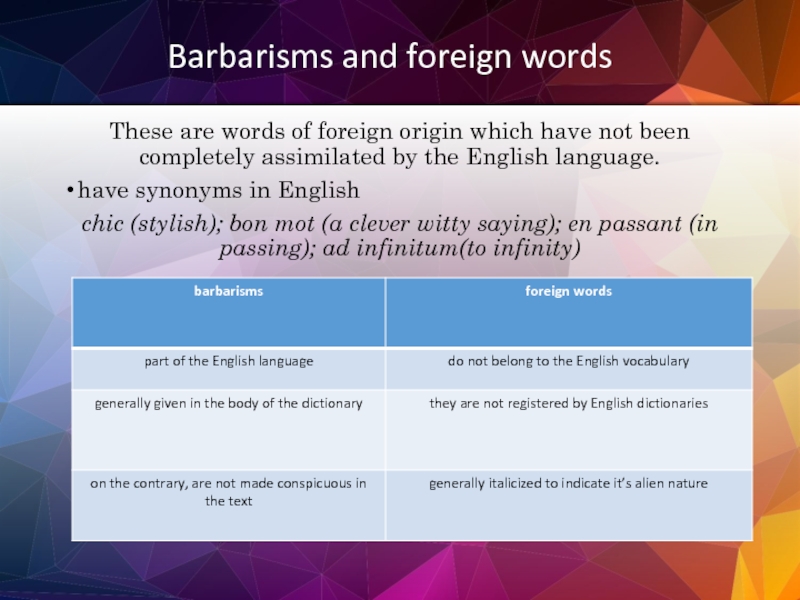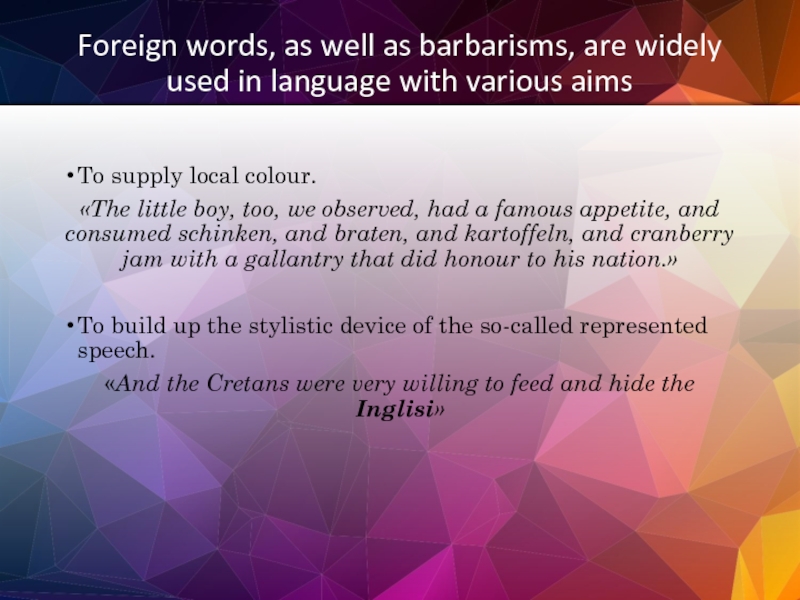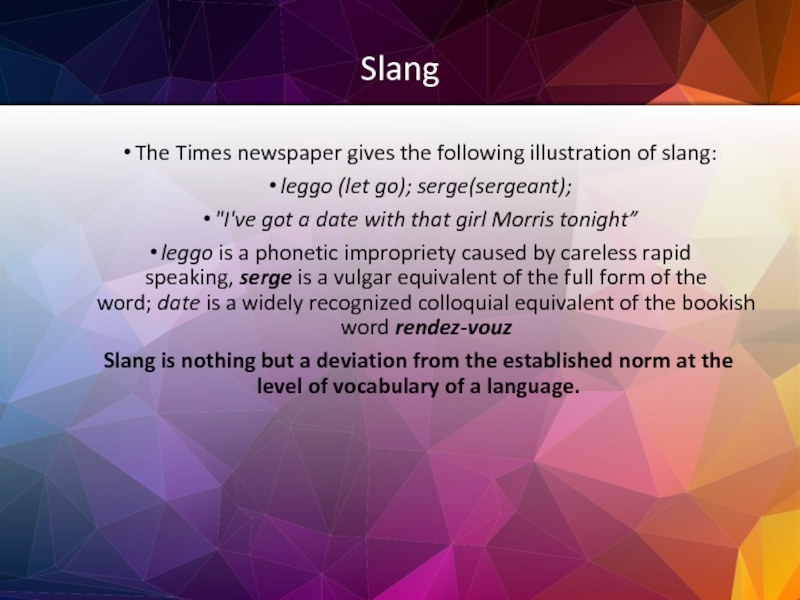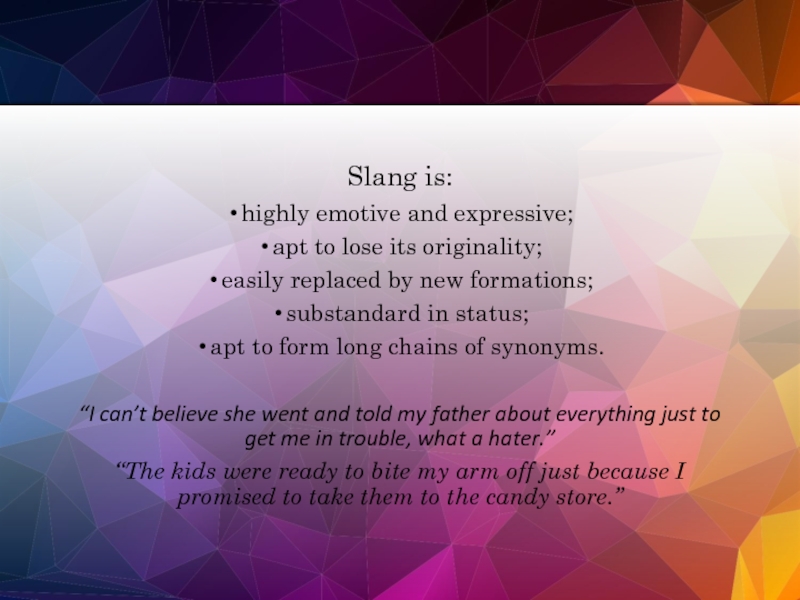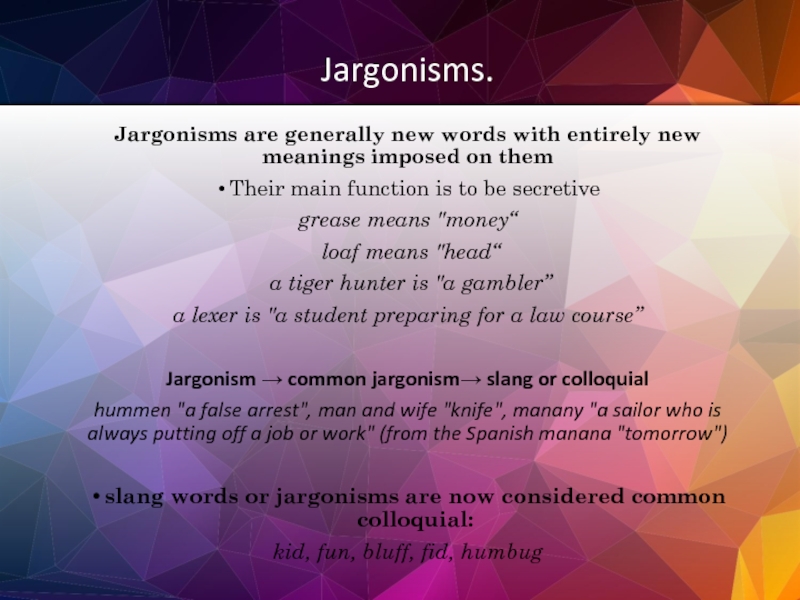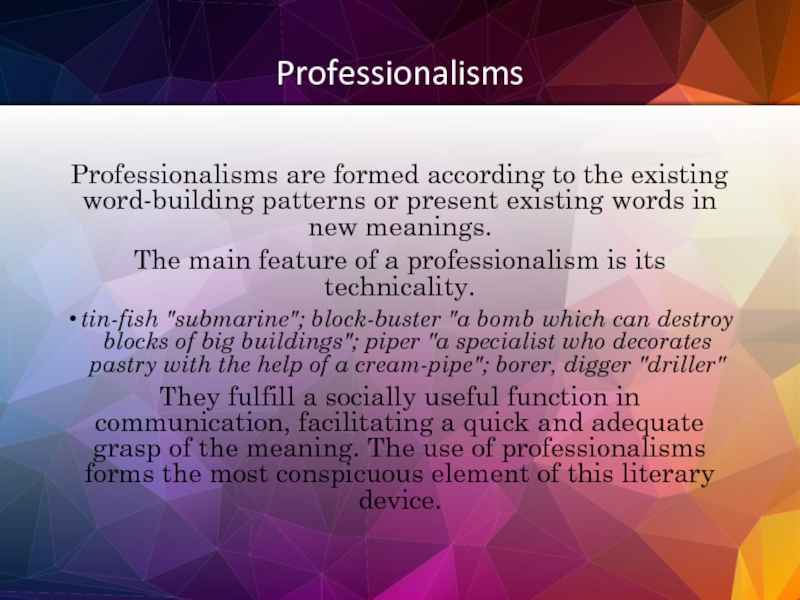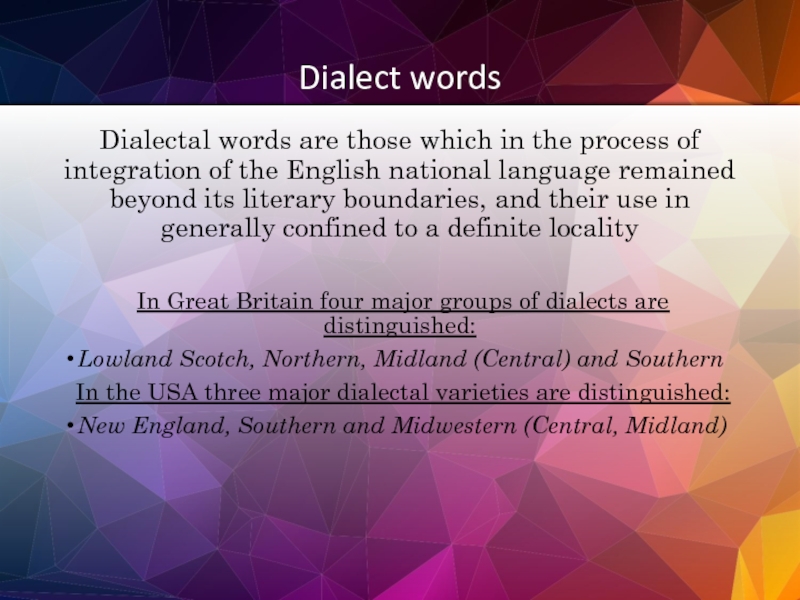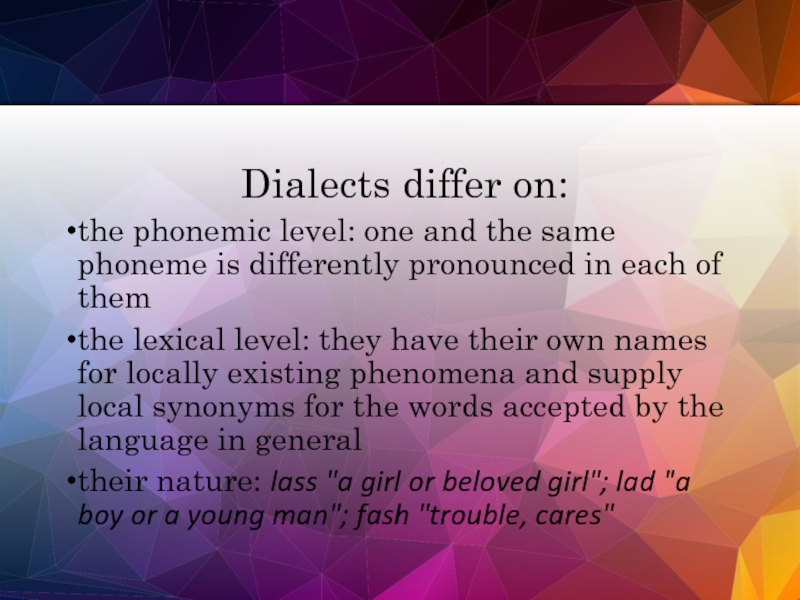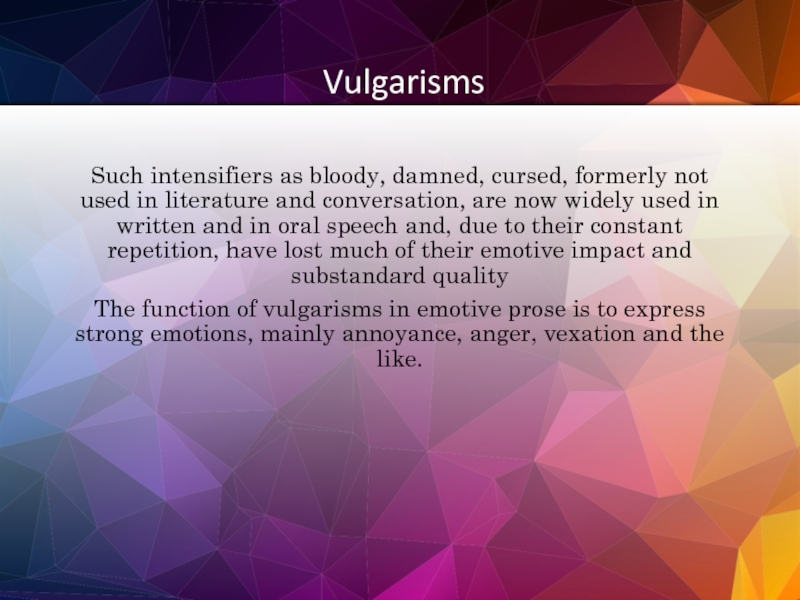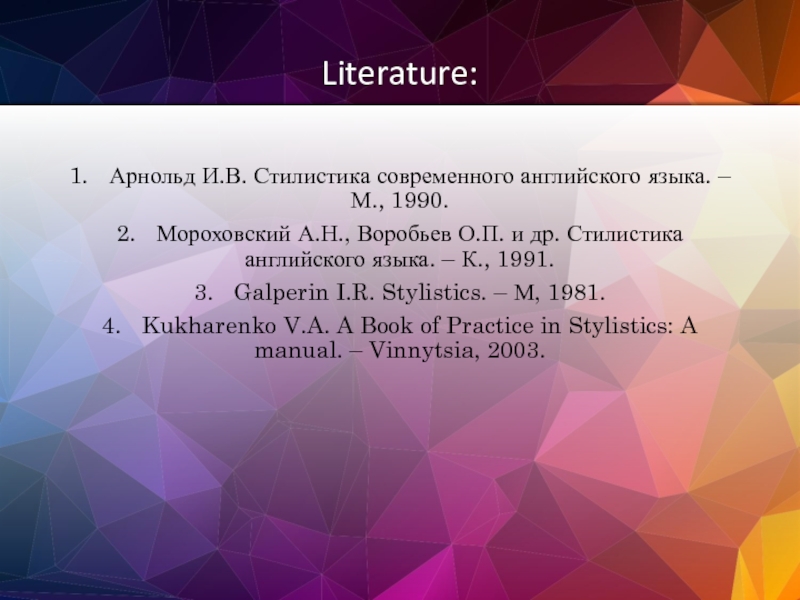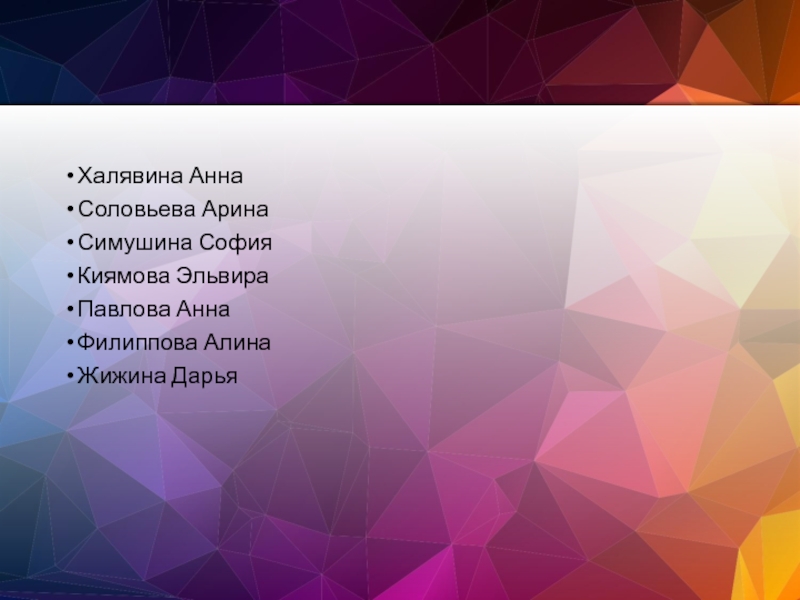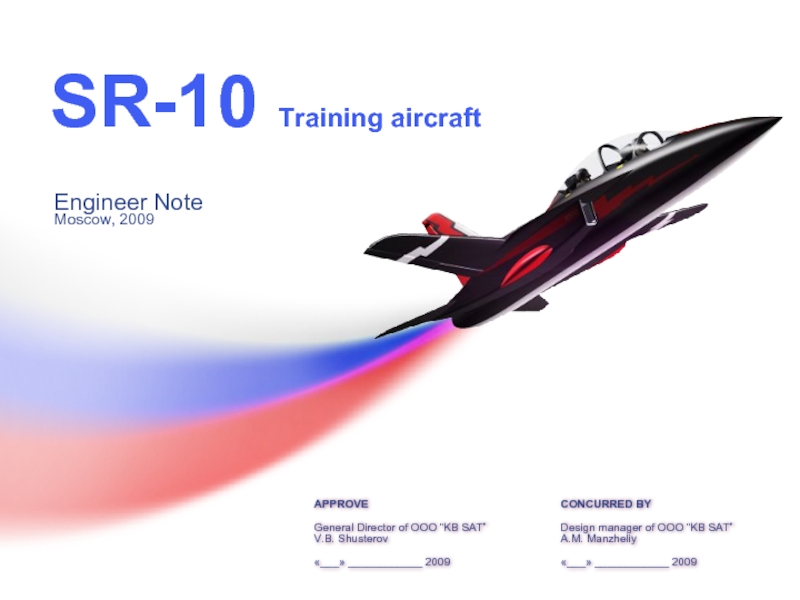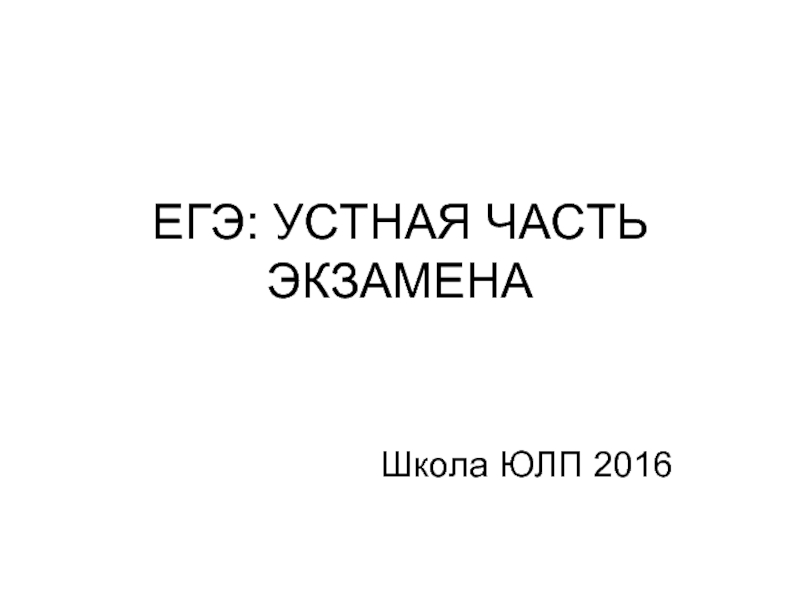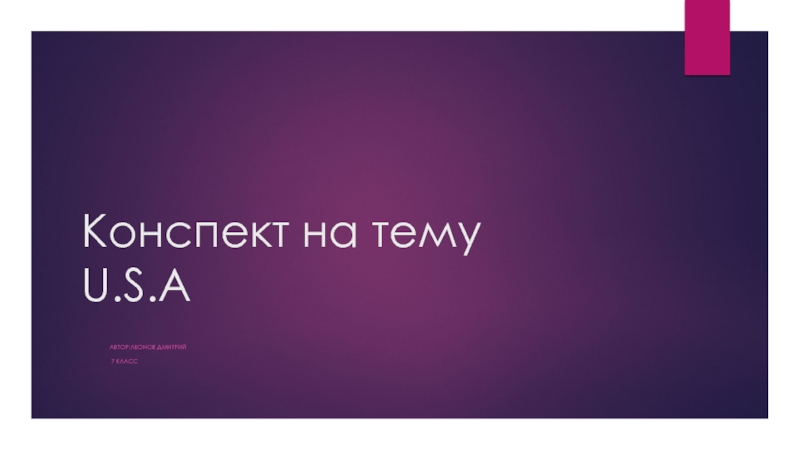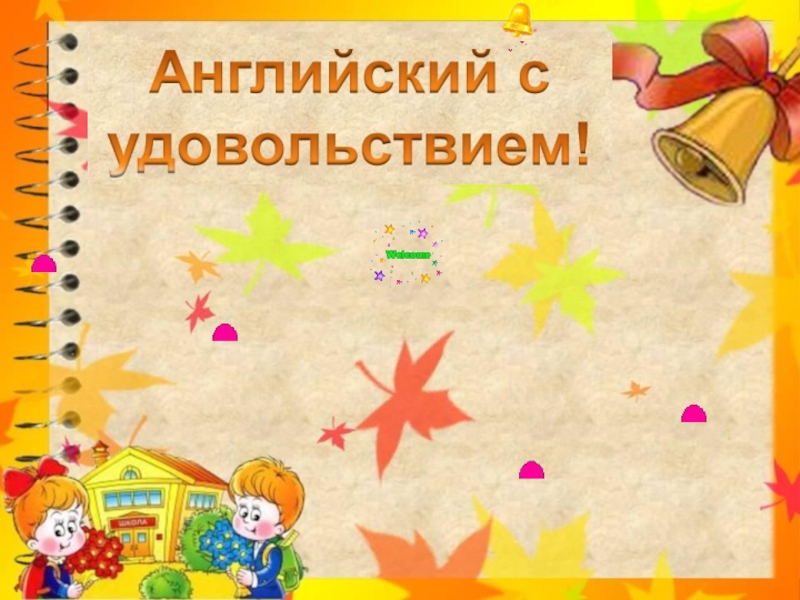- Главная
- Разное
- Дизайн
- Бизнес и предпринимательство
- Аналитика
- Образование
- Развлечения
- Красота и здоровье
- Финансы
- Государство
- Путешествия
- Спорт
- Недвижимость
- Армия
- Графика
- Культурология
- Еда и кулинария
- Лингвистика
- Английский язык
- Астрономия
- Алгебра
- Биология
- География
- Детские презентации
- Информатика
- История
- Литература
- Маркетинг
- Математика
- Медицина
- Менеджмент
- Музыка
- МХК
- Немецкий язык
- ОБЖ
- Обществознание
- Окружающий мир
- Педагогика
- Русский язык
- Технология
- Физика
- Философия
- Химия
- Шаблоны, картинки для презентаций
- Экология
- Экономика
- Юриспруденция
Stylistic differentiation of the English vocabulary презентация
Содержание
- 1. Stylistic differentiation of the English vocabulary
- 2. Neutral, common literary and common colloquial
- 3. Neutral, common literary and common colloquial vocabulary
- 4. Neutral words universal character: they are
- 5. We shall find literary words in authorial
- 6. Terms are directly connected with the concept
- 7. Main groups of terms depending on the
- 8. Archaic, obsolescent and obsolete words Obsolescent word
- 9. Obsolete words - words that have already
- 10. Archaic words vs historical words Historical words
- 11. mostly used in the creation of a
- 12. Barbarisms and foreign words These are words
- 13. Foreign words, as well as barbarisms, are
- 14. Slang The Times newspaper gives the following illustration
- 15. Slang is: highly emotive and expressive; apt
- 16. Jargonisms. Jargonisms are generally new words
- 17. Professionalisms Professionalisms are formed according to the
- 18. Dialect words Dialectal words are those which
- 19. Dialects differ on: the phonemic level:
- 20. Vulgarisms Such intensifiers as bloody, damned,
- 21. Literature: 1. Арнольд И.В. Стилистика современного английского языка.
- 22. Халявина Анна Соловьева Арина Симушина София Киямова Эльвира Павлова Анна Филиппова Алина Жижина Дарья
Слайд 2 Neutral, common literary and common colloquial vocabulary.
Terms.
Archaic, obsolescent
Barbarisms and foreign words.
Slang.
Jargonisms.
Professionalisms.
Dialect words.
Vulgarisms.
Poetic words
Слайд 3Neutral, common literary and common colloquial vocabulary
In accordance with the division
the literary layer the colloquial layer
the neutral layer
Слайд 4Neutral words
universal character: they are unrestricted in use and can
the most stable layer
the main source of synonymy and polysemy
mostly monosyllabic
has no specific colouring, whereas both literary and colloquial have a definite stylistic connotation
mainly used in writing and in polished speech
Colloquial words have a lively spoken character, so they are used in non-official speech, they are very vivid and suggestive in character.
Слайд 5We shall find literary words in authorial speech, descriptions, considerations, while
Слайд 6Terms are directly connected with the concept it denotes
we can come
in a work of creative prose a term may acquire a stylistic function and become a stylistic device.
“What a fool Rawdon Crawley has been,” Clump replied, “to go and marry a governess. There was something about the girl too. Green eyes, fair skin, pretty figure, famous frontal development”
Undergoing determination - many words that used to be terms have lost their quality as terms and passed into the common literary or even neutral vocabulary: “radio”, “television”
Слайд 7Main groups of terms depending on the character of their etymology
Terms
botany, anatomy, schedule (Greek);
locomotive, chivalry, march, parliament, estate (Latin);
facade, retreat, maneuver, squad, coup d’etat, cliché (French);
cobalt, zinc, quartz, sauerkraut (German)
Terms formed from the common word stock:
tank, company (milit.);
wing (archit);
fading, jamming (radio)
Terms formed by means of special suffixes and prefixes:
ultra-violet, antidote, transplant
Слайд 8Archaic, obsolescent and obsolete words
Obsolescent word - it gradually passes out
pronoun thou and its forms - thee, thy and thine;
the corresponding verbal ending -est and the verb-forms art, wilt (thou makest, thou wilt);
the ending -(e)th instead of-(e)s and the pronoun ye
Many French borrowings: a pallet (a straw mattress); a palfrey (a small horse)
Слайд 9Obsolete words - words that have already gone completely out of
methinks (it seems to me); nay (no)
Archaic proper - words which are no longer recognizable in Modern English, words that were in use in Old English and which have either dropped out of the language entirely or have changed in their appearance so much that they have become unrecognizable
troth (faith); a losel (a worthless, lazy fellow)
Слайд 10Archaic words vs historical words
Historical words denote historical events, customs, material
thane, yeoman, goblet
have no synonyms (archaic words may be replaced by modern synonyms)
Слайд 11mostly used in the creation of a realistic background to historical
can be used for satirical purposes
"Perfect love casteth off fear“
Casteth off = cast off
Archaic words, word-forms and word combinations may be used for creating an elevated effect
Functions of archaic words
Слайд 12Barbarisms and foreign words
These are words of foreign origin which have
have synonyms in English
chic (stylish); bon mot (a clever witty saying); en passant (in passing); ad infinitum(to infinity)
Слайд 13Foreign words, as well as barbarisms, are widely used in language
To supply local colour.
«The little boy, too, we observed, had a famous appetite, and consumed schinken, and braten, and kartoffeln, and cranberry jam with a gallantry that did honour to his nation.»
To build up the stylistic device of the so-called represented speech.
«And the Cretans were very willing to feed and hide the Inglisi»
Слайд 14Slang
The Times newspaper gives the following illustration of slang:
leggo (let go); serge(sergeant);
"I've got a date
leggo is a phonetic impropriety caused by careless rapid speaking, serge is a vulgar equivalent of the full form of the word; date is a widely recognized colloquial equivalent of the bookish word rendez-vouz
Slang is nothing but a deviation from the established norm at the level of vocabulary of a language.
Слайд 15Slang is:
highly emotive and expressive;
apt to lose its originality;
easily replaced by
substandard in status;
apt to form long chains of synonyms.
“I can’t believe she went and told my father about everything just to get me in trouble, what a hater.”
“The kids were ready to bite my arm off just because I promised to take them to the candy store.”
Слайд 16Jargonisms.
Jargonisms are generally new words with entirely new meanings imposed
Their main function is to be secretive
grease means "money“
loaf means "head“
a tiger hunter is "a gambler”
a lexer is "a student preparing for a law course”
Jargonism → common jargonism→ slang or colloquial
hummen "a false arrest", man and wife "knife", manany "a sailor who is always putting off a job or work" (from the Spanish manana "tomorrow")
slang words or jargonisms are now considered common colloquial:
kid, fun, bluff, fid, humbug
Слайд 17Professionalisms
Professionalisms are formed according to the existing word-building patterns or present
The main feature of a professionalism is its technicality.
tin-fish "submarine"; block-buster "a bomb which can destroy blocks of big buildings"; piper "a specialist who decorates pastry with the help of a cream-pipe"; borer, digger "driller"
They fulfill a socially useful function in communication, facilitating a quick and adequate grasp of the meaning. The use of professionalisms forms the most conspicuous element of this literary device.
Слайд 18Dialect words
Dialectal words are those which in the process of integration
In Great Britain four major groups of dialects are distinguished:
Lowland Scotch, Northern, Midland (Central) and Southern
In the USA three major dialectal varieties are distinguished:
New England, Southern and Midwestern (Central, Midland)
Слайд 19 Dialects differ on:
the phonemic level: one and the same phoneme
the lexical level: they have their own names for locally existing phenomena and supply local synonyms for the words accepted by the language in general
their nature: lass "a girl or beloved girl"; lad "a boy or a young man"; fash "trouble, cares"
Слайд 20 Vulgarisms
Such intensifiers as bloody, damned, cursed, formerly not used in
The function of vulgarisms in emotive prose is to express strong emotions, mainly annoyance, anger, vexation and the like.
Слайд 21Literature:
1. Арнольд И.В. Стилистика современного английского языка. – М., 1990.
2. Мороховский А.Н., Воробьев
3. Galperin I.R. Stylistics. – М, 1981.
4. Kukharenko V.A. A Book of Practice in Stylistics: A manual. – Vinnytsia, 2003.
